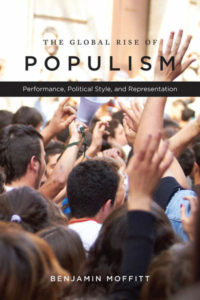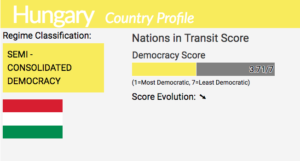 European Union leaders warned that it was a red line, and dared Hungary not to cross it. The U.S. ambassador pegged the issue as his top priority. In the streets of Budapest, tens of thousands marched, The Washington Post reports:
European Union leaders warned that it was a red line, and dared Hungary not to cross it. The U.S. ambassador pegged the issue as his top priority. In the streets of Budapest, tens of thousands marched, The Washington Post reports:
But in the end, there was nothing to stop Prime Minister Viktor Orban — who calls all the shots at home and increasingly does the same with his supposedly more powerful allies in the West — from driving Central European University into exile. The school, established a quarter-century ago to educate a new generation of leaders and scholars after the collapse of the Iron Curtain, became on Monday the first university to be forced out of an E.U. nation.
The ejection marked one of the surest signals to date of autocracy’s return to Hungary, and the region, after decades of relative freedom. It also reflected a humbling for the West, which could not muster the strength to stand up to Orban. The Hungarian leader has made no secret that he wants to overturn the liberal international order from within and replace it with a system more akin to the illiberal despotism of Russia or China.
“This is a dark day for freedom in Hungary, and it’s a dark day for academic freedom,” said CEU’s rector, Michael Ignatieff.
“This is unprecedented,” he added. “A U.S. institution has been driven out of a country that is a NATO ally. A European institution has been ousted from a member state of the E.U.”
 Democracy in Hungary is “dying a slow death,” according to former CEU director John Shattuck, assistant secretary of state for democracy, human rights and labor under President Bill Clinton.
Democracy in Hungary is “dying a slow death,” according to former CEU director John Shattuck, assistant secretary of state for democracy, human rights and labor under President Bill Clinton.
“In the wake of the financial crisis in 2010, many Hungarians began to reject liberal democracy and the concept of a market economy because they felt no better off than they were under Communism, especially because they lost their social benefits,” he told Harvard’s Carr Center for Human Rights Policy. “The bottom line on this Orbán-style soft authoritarianism is that it is succeeding, it is growing, despite its vulnerabilities, including corruption.”
 Exactly what mix of factors has created such a fertile backdrop for populists is a subject of much debate, The Guardian’s Mark Rice-Oxley and Ammar Kalia observe: But as Benjamin Moffitt puts it in his book, The Global Rise of Populism: “The time is ripe for canny political actors who can speak effectively in the name of ‘the people’ to make great political gains.”
Exactly what mix of factors has created such a fertile backdrop for populists is a subject of much debate, The Guardian’s Mark Rice-Oxley and Ammar Kalia observe: But as Benjamin Moffitt puts it in his book, The Global Rise of Populism: “The time is ripe for canny political actors who can speak effectively in the name of ‘the people’ to make great political gains.”
Are they democrats?
By definition, yes. Populists operate within democratic systems, even though, once in power, some have a habit of chipping away at the tenets of liberal democracy, as Orbán has done in Hungary.
Hundreds of private Hungarian news outlets have been simultaneously donated by their owners to a central holding company run by people close to Orban, cementing his grip on the Hungarian news media, :
 It is the latest broadside against pluralism under the increasingly autocratic Mr. Orban. Since taking power in 2010, he has steadily chipped away at Hungary’s checks and balances, stacking the Constitutional Court with loyalists, reshaping the electoral system to favor his party and placing dozens of watchdog institutions — including the judiciary and prosecution service — under the leadership of his allies.
It is the latest broadside against pluralism under the increasingly autocratic Mr. Orban. Since taking power in 2010, he has steadily chipped away at Hungary’s checks and balances, stacking the Constitutional Court with loyalists, reshaping the electoral system to favor his party and placing dozens of watchdog institutions — including the judiciary and prosecution service — under the leadership of his allies.
“It’s a massive change, but it’s more about the symbolism,” said Zselyke Csaky, the research director for Europe and Eurasia at Freedom House. The Hungarian media is now “beginning to resemble state media under Communism because of the level of control and consolidation.”
The Freedom House index classified Hungary as a “consolidated democracy” when Orban assumed office in 2010, but now deems it only a “semi-consolidated democracy.” The media is only “partly free” having fallen nearly 50 places on the Freedom House scale since Orban’s election.
“The boldness of the move shows that Orban seems to have lost some of his pragmatism,” Ms. Csaky said. “With this move….and C.E.U. leaving, it seems like he trusts his instincts more and more, certain that there will be no pushback from the European Union.”
 Hungary has become a successful laboratory of illiberal governance, according to Péter Krekó, director of the Political Capital Institute and assistant professor of political science at ELTE University in Budapest, and Zsolt Enyedi, professor of political science at the Central European University in Budapest.
Hungary has become a successful laboratory of illiberal governance, according to Péter Krekó, director of the Political Capital Institute and assistant professor of political science at ELTE University in Budapest, and Zsolt Enyedi, professor of political science at the Central European University in Budapest.
Fidesz has remodeled the country’s institutions to suit ruling-party purposes. Identity politics and conspiracy theories abound, as state-funded media churn out fake news. Given the positive voter feedback regarding all this, we should expect it to continue, they wrote for the National Endowment for Democracy’s Journal of Democracy.







